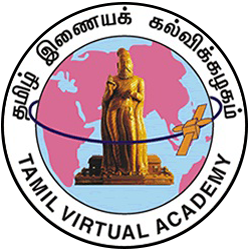Primary tabs
LESSON - 6
p20346 Characteristics of Contemporary Tamil
Prose
This
lesson discusses the various aspects of contemporary
Tamil prose. The 16th
century is regarded as an important
turning point in the history of
Tamil prose. The seeds of what
may be termed as ‘contemporary Tamil prose’ are
to be
found in the beginning of the 16th century. The
advent of the
Europeans, the influence of the Christian missionaries and
the
introduction of the printing press served as catalysts to Tamil
prose.
In the 17th and 18th centuries writers like Vedanaayagar
and Veeramaamunivar liberated Tamil
prose from the
constricting tradition of ‘urainoolgal’
or commentaries.
Pamphlets published by Christian missionaries
during this
period exerted a considerable influence on Tamil prose.
In
the 19th century Tamil prose reached new heights, thanks to
the efforts of writers like Aarumuga Naavalar and Veerasamy
Chettiyar. These two writers simplified Tamil prose and took
it to the
masses. The 20th century is regarded as the golden
age of Tamil prose.
Nurtured and shaped by several renowned
writers, Tamil prose traveled in
new directions. The writings of
Vedanayagam Pillai and Rajam Iyer are
noted for their use of
the language of everyday speech. Their unique prose style
appealed to the masses. Maraimalai Adigal, who is credited
with the invention of the ‘ThanithTamil Nadai’ or pure Tamil
style,
made significant contribution to Tamil prose. The bold,
inspiring prose of Periyar, the daringly original
style of
Thiru.Vi.Ka., Barathiyaar and Va.Ra. provided the necessary
impetus for the growth of Tamil prose. The
writings of
Pudumaipithan lent a totally new perspective to Tamil prose.
New and imaginative efforts became the order of the day.
Experimentation
with form and the use of regional dialects led
to the evolution of new styles. Today Tamil
prose has
reached the zenith of its development.
Several renowned and
talented writers have enriched Tamil prose
through their
writings. Ki. Rajanarayanan, A. Marx, S. Ramakrishnan, Bama,
P.
Sivagami and Salma are some of them.

